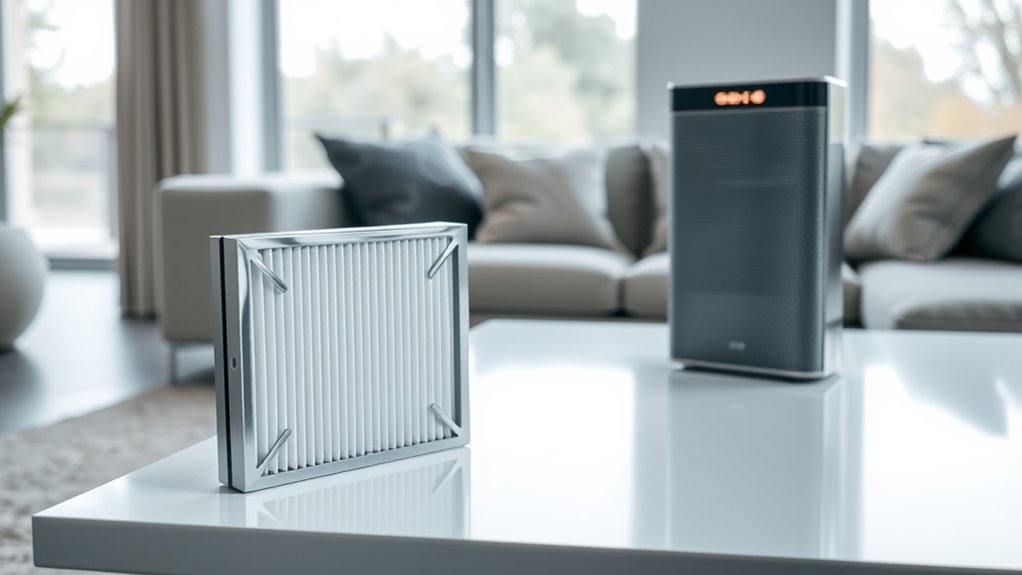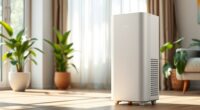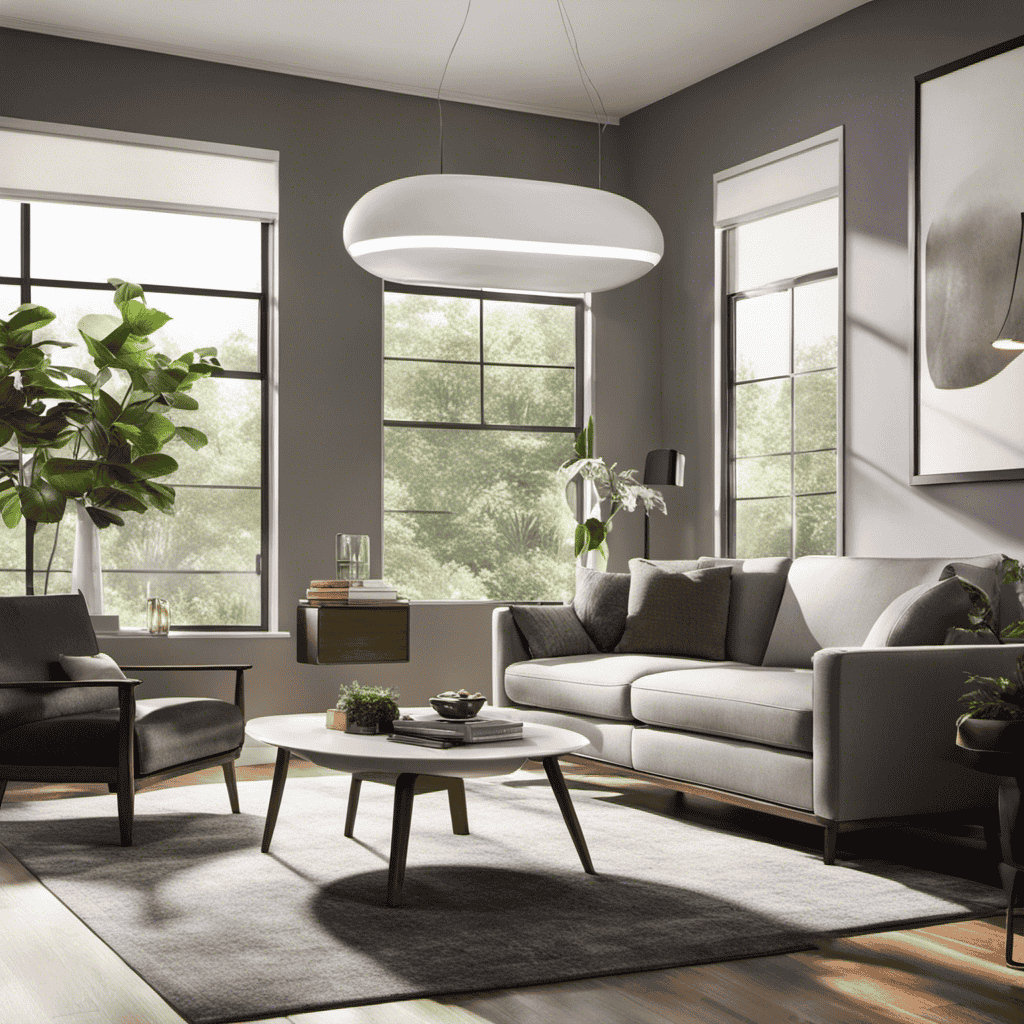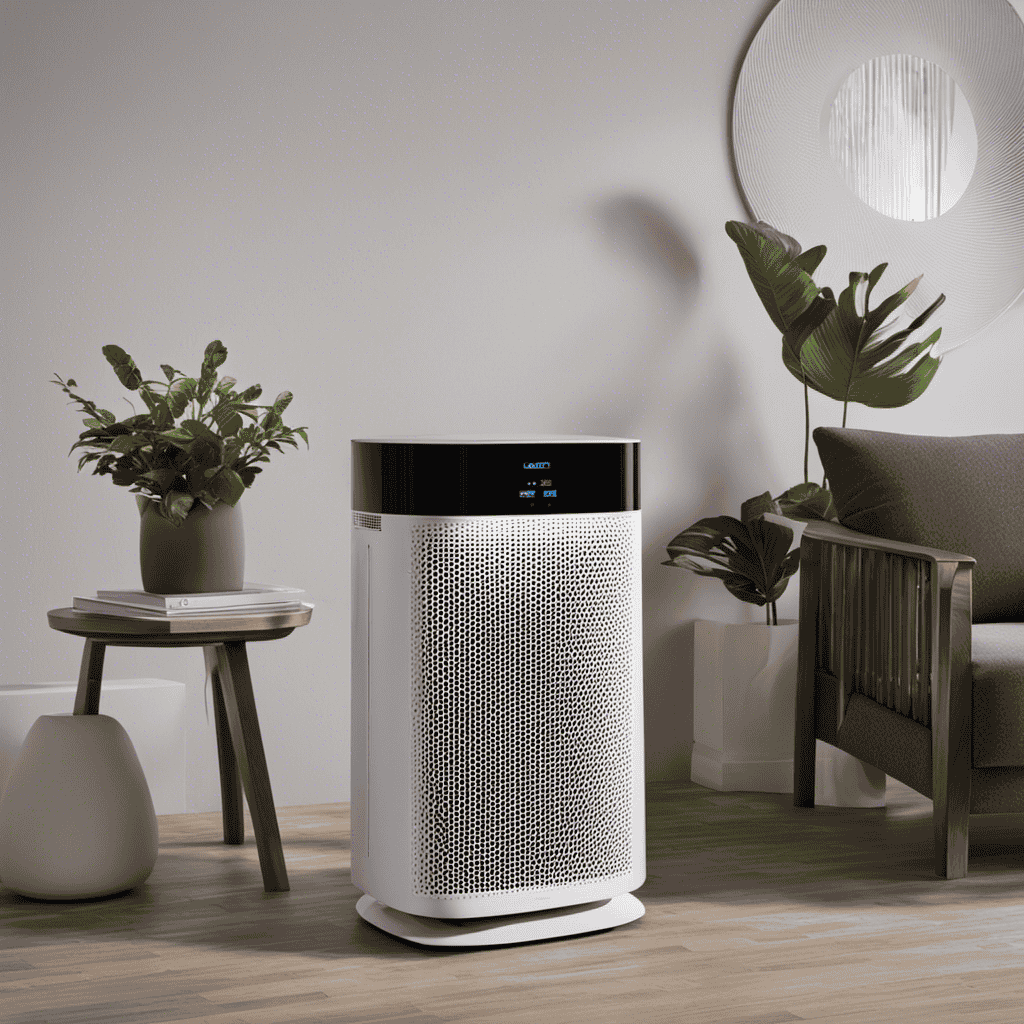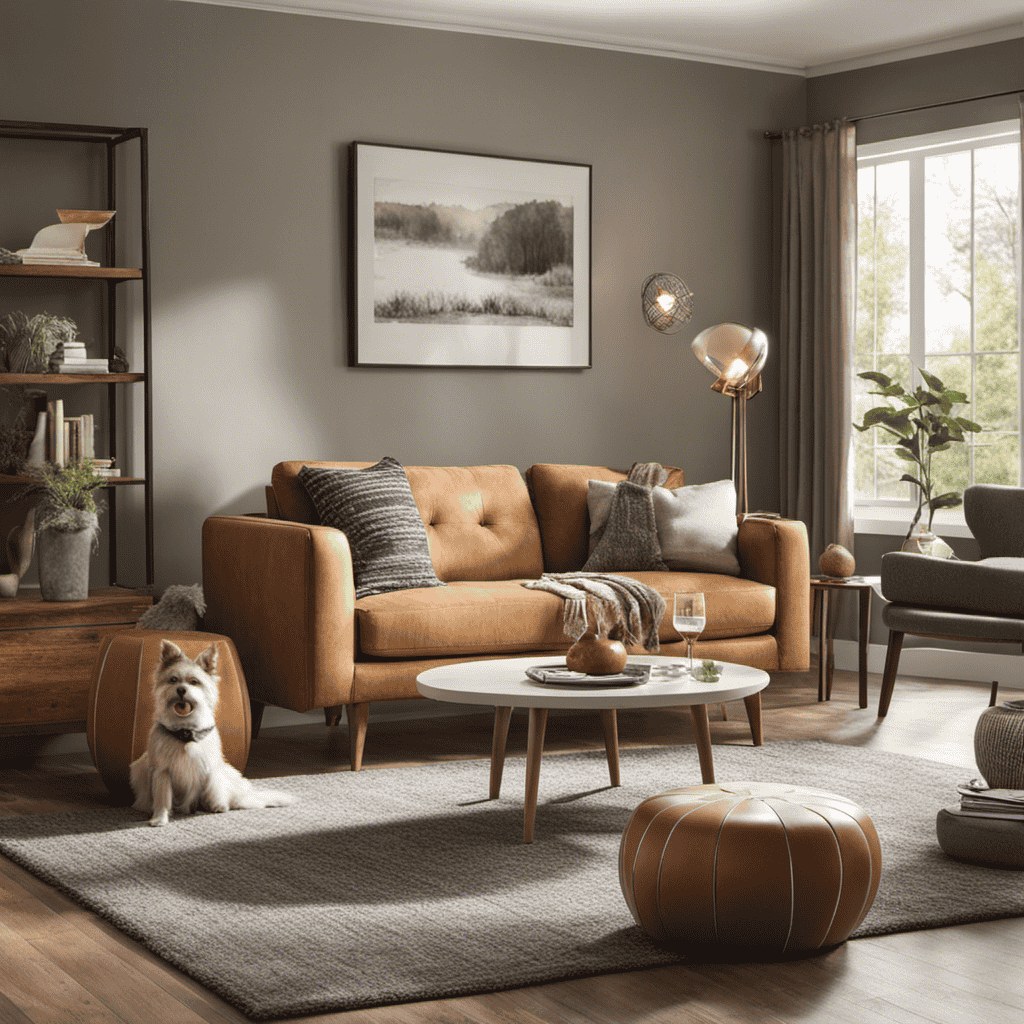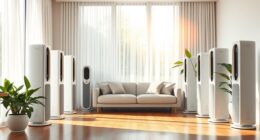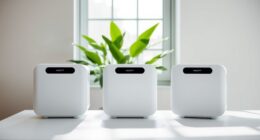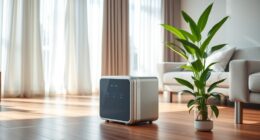Even with a high-quality HVAC filter, an air purifier can still provide extra protection against microscopic pollutants like viruses, bacteria, pet dander, and odors that filters alone often miss. HVAC filters mainly capture larger particles, while air purifiers with HEPA filters and activated carbon can target allergens, chemicals, and germs more effectively. If you want cleaner, healthier indoor air, it’s worth considering additional purification—keep exploring to discover the best options for your needs.
Key Takeaways
- Good HVAC filters mainly trap large particles but are less effective against viruses, bacteria, gases, and odors.
- Air purifiers with HEPA and activated carbon filters target microscopic pollutants and persistent odors better than standard HVAC filters.
- In high-pollution or smoke-prone environments, an air purifier provides additional protection beyond your HVAC system.
- For allergy or asthma sufferers, air purifiers help remove tiny allergens and airborne microbes that HVAC filters may miss.
- Combining both systems enhances overall indoor air quality, especially during health crises or in heavily polluted areas.
How Do HVAC Filters and Air Purifiers Differ?
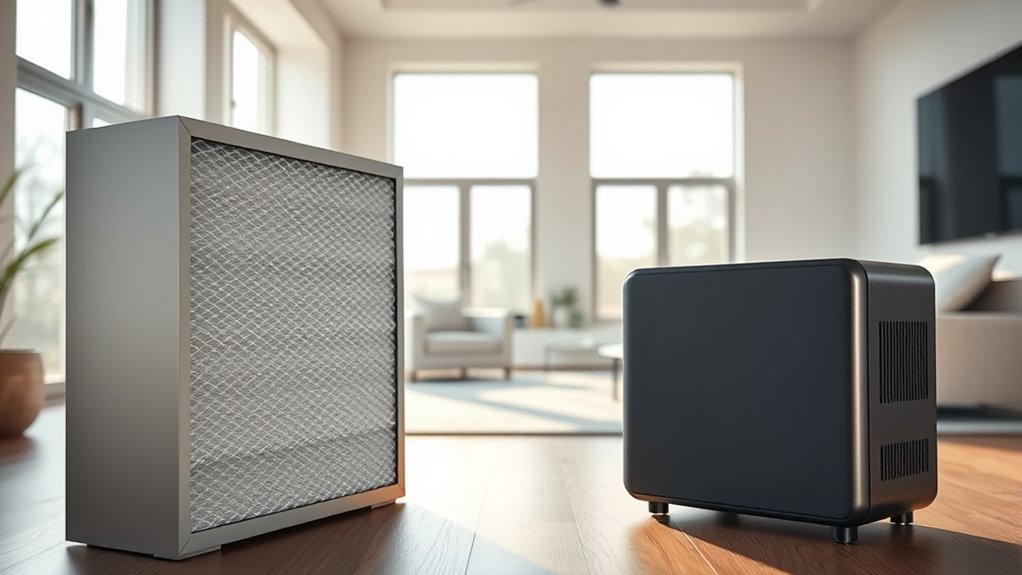
Have you ever wondered how HVAC filters and air purifiers differ in their purpose and function? Both improve air quality, but they do so differently. HVAC filters are installed in your heating and cooling system, using filtration technology to trap dust, pollen, and larger particles as air circulates through your home’s ductwork. They’re designed to protect the system and improve overall air quality but aren’t primarily aimed at removing smaller pollutants. Efficiency of filtration is an important factor to consider when choosing between the two, as HVAC filters typically target larger particles. Air purifiers, on the other hand, are standalone units that actively clean the air in a specific space. They use advanced filtration technology, like HEPA filters, to target tiny particles, allergens, and airborne contaminants directly. This distinction helps you decide whether a filter or purifier best suits your needs for cleaner, healthier indoor air. HEPA filtration is especially effective at removing allergens and microscopic particles that HVAC filters may not capture efficiently. Additionally, air purifiers often feature air quality sensors that monitor and optimize performance for better results. Moreover, recent advances in AI-powered air quality management enable some purifiers to adapt their operation based on real-time conditions, providing more precise air purification. Incorporating advanced filtering options can further enhance your air quality management strategy.
Types of Contaminants Each System Targets
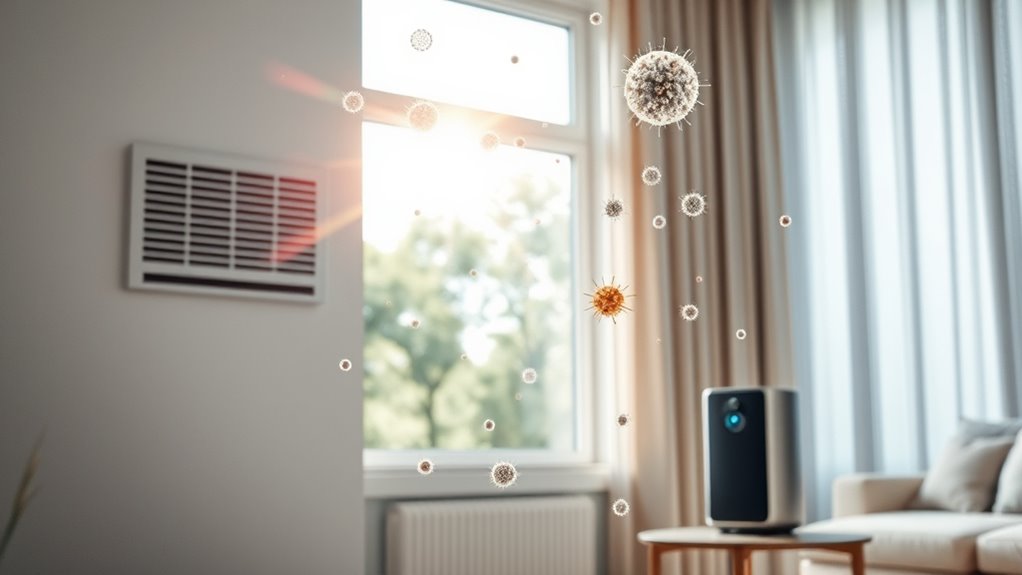
Both air purifiers and HVAC filters are designed to target different types of contaminants in your environment. You’ll find that some systems excel at removing particulate matter like dust and pollen, while others focus on filtering gases and odors. Additionally, certain filters can help reduce microbial and virus particles, providing extra protection for your indoor air. For example, Volkswagen TDI Tuning can optimize engine performance, but it doesn’t influence air quality and is unrelated to indoor filtration systems.
Particulate Matter Removal
Ever wonder how air purifiers and HVAC filters target different types of particulate matter? Both systems focus on removing particles that affect your air quality, but they do so differently. HVAC filters mainly trap dust, pollen, and pet dander, extending filter lifespan and maintaining airflow. Air purifiers, on the other hand, often use HEPA filters to capture smaller particles like smoke and bacteria that HVAC filters might miss. Here’s a quick comparison:
| Particle Type | HVAC Filter Target | Air Purifier Target |
|---|---|---|
| Dust & Pollen | Yes | Yes |
| Smoke & Chemicals | Sometimes | Yes |
| Bacteria & Viruses | Limited | Yes |
Understanding these differences helps you decide if a purifier complements your existing system to improve overall air quality. Additionally, some advanced air purifiers incorporate microbial filtration to further reduce airborne pathogens, which is particularly beneficial in improving indoor air quality. These devices can also be equipped with air quality sensors that detect contaminants and automatically adjust filtration levels, offering a smarter way to maintain a healthy environment. Modern air purifiers are also capable of detecting air quality levels, allowing for more precise control and monitoring. Incorporating regular maintenance of filters ensures both systems work efficiently to keep your air clean.
Gas and Odor Filtration
Are gas contaminants and odors lingering in your indoor air more than you’d like? If so, your HVAC filter alone might not be enough. Gas contaminants and odors often require specialized filtration, like activated carbon filters, to effectively remove them. Some systems incorporate ozone generation technology to neutralize stubborn odors, but this can pose health concerns if not properly managed. For allergen removal, certain filters target gases released by pets, cleaning products, and cooking. While high-quality HVAC filters help reduce airborne particles, they don’t typically eliminate gas-phase contaminants. Adding an air purifier with gas and odor filtration can considerably improve air quality, especially if odors or chemical fumes are persistent. Consider your specific needs to determine whether upgrading your system is necessary for cleaner, fresher indoor air. Additionally, understanding AI’s vulnerabilities can help in evaluating the effectiveness of different filtration technologies. For optimal results, regularly replacing filters and considering specialized air purifiers can further enhance indoor air quality.
Microbial and Virus Control
While gas and odor filters improve indoor air quality by targeting chemical pollutants, addressing microbial and viral contaminants requires different strategies. UV sterilization is highly effective for microbial suppression, as it destroys bacteria, viruses, and mold spores by damaging their DNA. HVAC systems equipped with UV lights can actively reduce the spread of pathogens throughout your home. These systems don’t just trap microbes; they neutralize them at the source. Air purifiers with UV sterilization provide an extra layer of protection, especially during flu seasons or pandemics. If maintaining a healthier indoor environment is your goal, combining good filtration with UV sterilization ensures thorough control over microbial and viral contaminants, making your home safer and cleaner. Incorporating proper maintenance of your air purification system can further enhance its effectiveness in pathogen reduction. Additionally, system design plays a crucial role in how effectively these systems can target airborne microbes. Properly designed systems optimize UV light exposure to maximize sterilization efficiency, ensuring better indoor air safety. Moreover, advancements in UV technology continue to improve the speed and effectiveness of microbial inactivation, providing more reliable air purification.
Effectiveness of HVAC Filters in Removing Particles
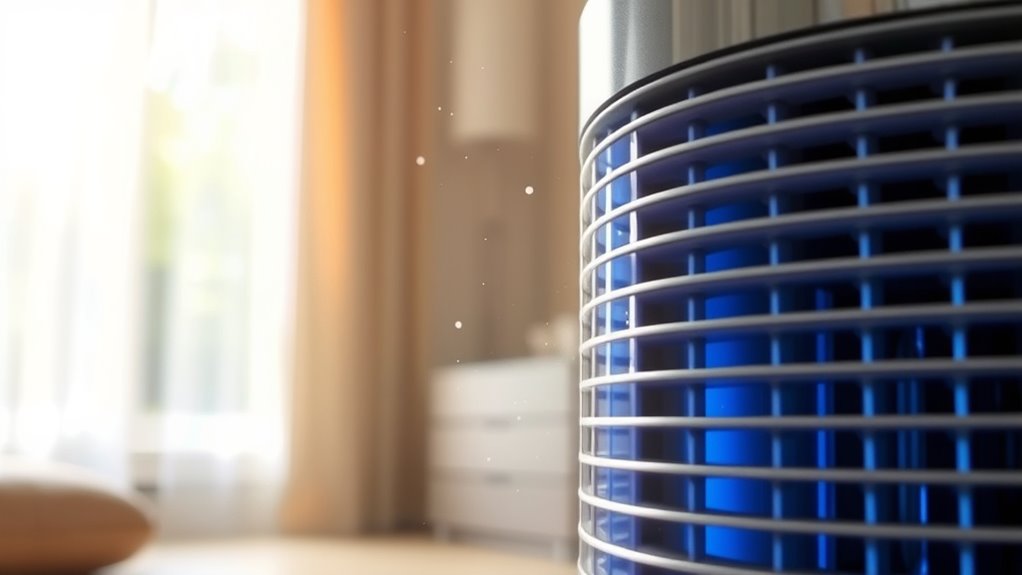
HVAC filters vary in how well they trap particles, depending on their efficiency ratings. Smaller particles, like viruses and fine dust, require higher-grade filters to be effectively removed. Regular filter maintenance plays a vital role in keeping these systems working at their best. Additionally, using exfoliating skincare can help improve skin health and clarity, complementing the overall indoor environment quality. Understanding the filtration efficiency ratings of your HVAC system can help determine whether additional air purification methods are necessary for optimal indoor air quality. A thorough knowledge of air filtration standards can further assist in selecting the most suitable filtering options for your needs. Moreover, being aware of tuning benefits in vehicle performance highlights the importance of proper maintenance and component upgrades for optimal operation.
Furthermore, recognizing the particle sizes that HVAC filters can capture ensures you select the appropriate filtration system for your specific concerns.
Filtration Efficiency Levels
Filtration efficiency levels determine how well an HVAC filter can capture airborne particles, directly impacting indoor air quality. Higher efficiency filters can trap smaller particles, leading to cleaner air and improved health. However, these filters often have a shorter filter lifespan because they clog faster when filtering fine particles. Choosing a filter with the right efficiency balance is key; a filter that’s too dense may reduce airflow and strain your system, while one that’s too loose won’t improve air quality appreciably. You’ll need to replace high-efficiency filters more often, but the trade-off is better indoor air quality. Ultimately, understanding the filtration efficiency level helps you select the right filter to optimize both air quality and filter lifespan.
Particle Size Removal
How effectively a filter removes airborne particles depends largely on its ability to trap particles of different sizes. HEPA standards specify that filters must capture at least 99.97% of particles 0.3 microns in size, a challenging benchmark for most HVAC filters. Smaller particles, like viruses and some bacteria, are harder to filter but can still be removed with high-efficiency filters. Larger particles, such as dust and pollen, are easier to trap. The table below highlights how different filters perform across particle sizes:
| Particle Size (microns) | Typical Filter Type | Effectiveness |
|---|---|---|
| 0.3 | HEPA | >99.97% |
| 1-10 | High-efficiency HVAC | Very effective |
| >10 | Standard HVAC | Moderate to high efficiency |
This shows that high-efficiency filters excel at removing a broad range of particle sizes. Additionally, understanding the particle filtration efficiency helps determine whether a dedicated air purifier is necessary for improved indoor air quality. Properly maintained HVAC filters can significantly reduce indoor pollutants, but the filter lifespan and replacement frequency are also crucial factors to ensure optimal performance. Regularly checking the filter efficiency ratings can help homeowners decide if supplemental air purification is needed. Moreover, considering the air exchange rate can further improve indoor air quality by reducing pollutant buildup. Ensuring proper airflow around the unit also enhances the overall effectiveness of filtration.
Filter Maintenance Impact
Regularly maintaining your air filters is essential because their ability to remove airborne particles diminishes over time. When filters become clogged or dirty, airflow decreases, and their efficiency in capturing dust, pollen, and pollutants drops considerably. This reduction directly impacts your air quality, allowing more particles to circulate indoors. Consistent maintenance routines, such as timely filter replacements and inspections, ensure your HVAC system performs at its best. Dirty filters not only compromise air cleanliness but also strain your system, leading to higher energy costs and potential breakdowns. By keeping your filters clean, you maximize their particle removal capabilities and maintain healthier indoor air. Additionally, filter maintenance schedules can help you stay on top of timely replacements and inspections, preventing performance issues. Skipping maintenance can lead to decreased effectiveness and poorer air quality, defeating the purpose of having a good HVAC filter in the first place.
Benefits of Adding an Air Purifier to Your Home
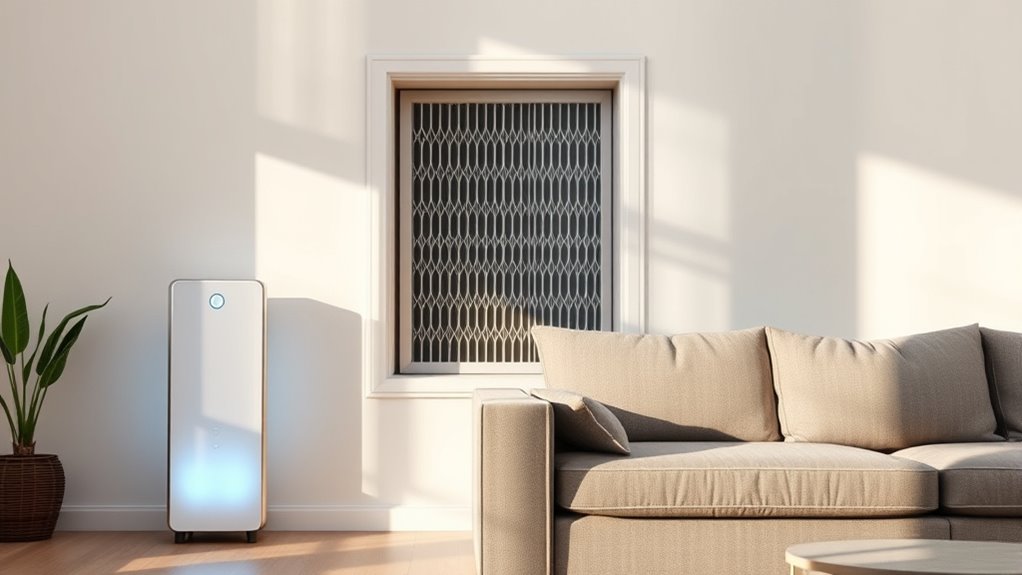
Adding an air purifier to your home can substantially improve indoor air quality by removing pollutants, allergens, and airborne pathogens. It works alongside your HVAC system to target particles that filters alone might miss, especially tiny allergens like pet dander, pollen, and dust mites. With an air purifier, you’ll notice a reduction in allergens, making your living space healthier and more comfortable. This is especially beneficial if someone in your home has allergies or respiratory issues. Plus, air purifiers help eliminate odors and airborne bacteria, enhancing overall air freshness. By investing in an air purifier, you guarantee cleaner, safer indoor air, reducing the risk of allergy flare-ups and respiratory discomfort. It’s a practical step toward a healthier, more breathable environment in your home.
Situations When an Air Purifier Becomes Essential
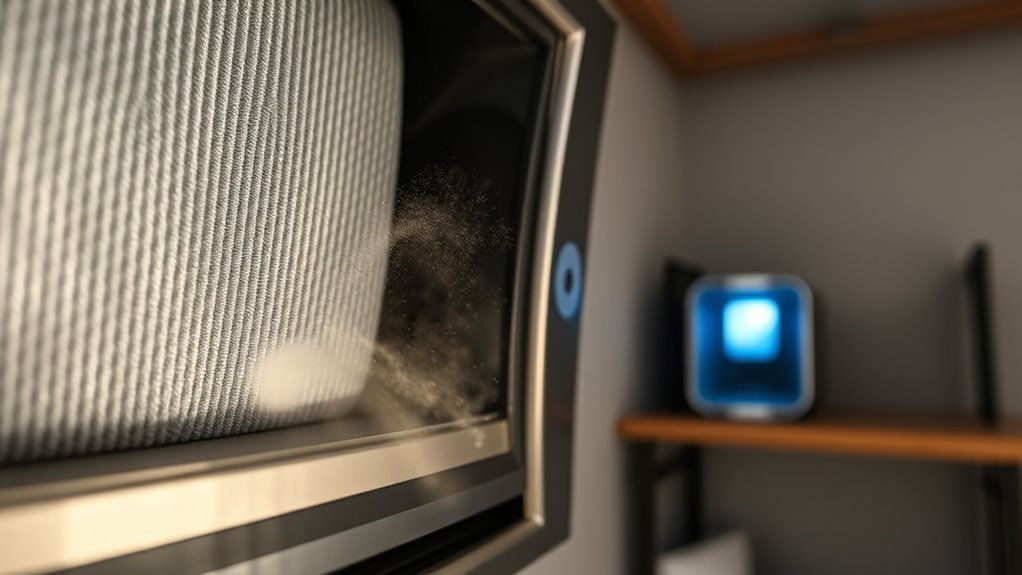
Certain situations make it clear when an air purifier can markedly improve your indoor air quality. If you suffer from indoor allergies, especially those triggered by dust, pollen, or mold, an air purifier can help remove those irritants from the air. If you have pets, their dander often circulates and aggravates allergies or asthma symptoms. In such cases, an air purifier becomes essential to reduce airborne pet allergens that even a good HVAC filter might miss. Additionally, if you notice persistent allergy symptoms despite your HVAC system’s filtration, adding an air purifier can provide that extra level of clean air. These devices are especially beneficial when air quality issues are ongoing, and you want to breathe easier with fewer allergy or pet-related triggers.
Choosing the Right Air Purifier for Your Needs
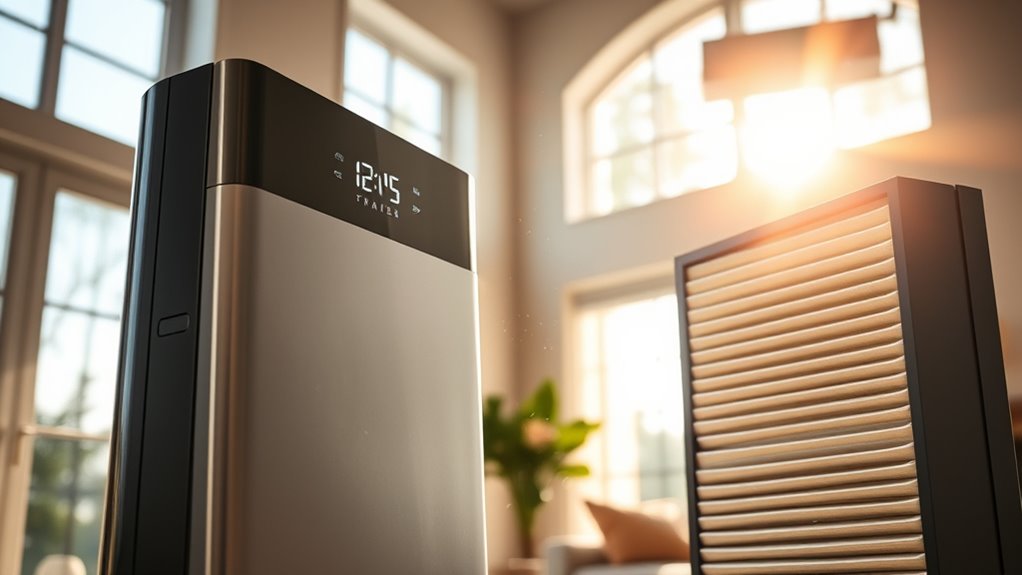
Choosing the right air purifier depends on understanding your specific indoor air quality needs. Start by identifying whether you’re targeting allergens, odors, or airborne pollutants. Research reputable air purifier brands that offer models suited to your concerns. Look for devices with appropriate filtration methods, like HEPA filters for allergens or activated carbon for odors. Consider the filter replacement process—some brands make it easier and more affordable to maintain. Check the filter lifespan to avoid frequent replacements that can increase costs. Also, ensure the purifier’s size matches your space for effective coverage. By focusing on your needs and comparing brand reliability and maintenance requirements, you’ll find an air purifier that effectively improves your indoor air quality without unnecessary hassle.
Cost-Benefit Analysis of Using Both Systems
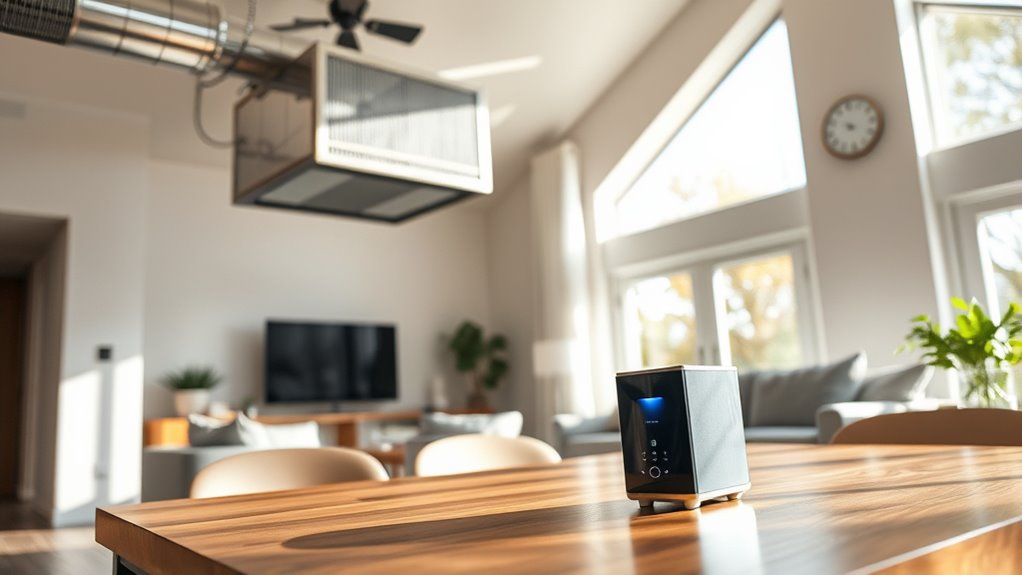
Using both an air purifier and HVAC filters can seem like a smart way to maximize indoor air quality, but it’s important to weigh the costs against the benefits. A thorough cost comparison reveals that running both systems increases overall expenses, especially with higher energy consumption. Air purifiers often use more electricity, adding to your monthly bills, while HVAC filters are generally more energy-efficient but need regular replacement. Consider whether the improved air quality justifies the additional costs. If your home has significant air quality issues, investing in both might be worthwhile. However, if your HVAC filter is high-quality and well-maintained, adding an air purifier may offer diminishing returns. Balancing these factors helps you make an informed decision that aligns with your budget and health priorities.
Frequently Asked Questions
Can an Air Purifier Improve Indoor Air Quality if I Already Have a High-Quality HVAC Filter?
An air purifier can boost indoor air quality even if you have a good HVAC filter. While your HVAC filter is great for trapping dust and allergens, an air purifier’s effectiveness often surpasses that of standard filters, especially for airborne particles like smoke or bacteria. Comparing your HVAC filter to an air purifier helps determine if additional purification is needed. In many cases, using both provides the best clean air solution for your home.
Do Air Purifiers Help With Odors Beyond Particle Filtration?
Imagine your home as a scent-filled garden—air purifiers act like skilled gardeners. They do more than just filter particles; they excel at odor elimination through chemical absorption, breaking down smells from pets, cooking, or smoke. While a good HVAC filter captures particles, air purifiers target odors directly, making your space fresher and more inviting. So, yes, air purifiers help with odors beyond particle filtration.
How Often Should I Replace or Maintain My Air Purifier?
You should replace or maintain your air purifier regularly to guarantee ideal filter maintenance and prolong the purifier’s lifespan. Typically, check the filter every 1 to 3 months, depending on usage and air quality. Replace the filter as recommended by the manufacturer, usually every 6 to 12 months. Proper upkeep keeps your purifier working efficiently, removes pollutants effectively, and extends its overall durability.
Are There Specific Health Conditions That Benefit Most From Air Purifiers?
Think of an air purifier as a gentle gatekeeper for your home’s air. If you have allergies or asthma, you’ll notice it’s especially helpful for allergy relief and asthma management. People with respiratory issues often breathe easier with cleaner air, as purifiers target allergens, pollen, and pet dander. So, if you struggle with these conditions, an air purifier can be a valuable tool in maintaining a healthier, more comfortable environment.
Is Noise From Air Purifiers a Concern in Quiet Environments?
Noise levels from air purifiers can be a concern if you prefer quiet environments, as some models produce ambient disturbance during operation. If you’re sensitive to sound, look for units with a low noise rating or sleep mode. You might also consider placement, like keeping the purifier in a less-used area, to minimize disruption. Ultimately, choosing a quieter model helps maintain peace without sacrificing air quality.
Conclusion
So, while a good HVAC filter is your home’s first line of defense, an air purifier can be the extra shield you need against unseen threats. Think of it as adding a secret weapon in your battle for cleaner air. If you’re dealing with allergies, pets, or pollution, investing in both might just be the key to truly breathe easier. After all, isn’t peace of mind worth the little extra effort?
